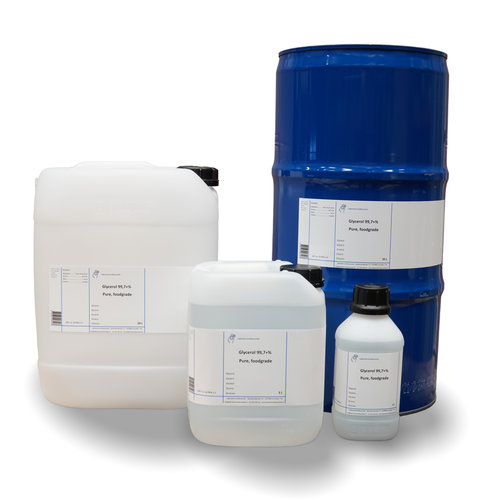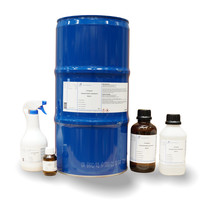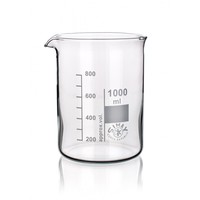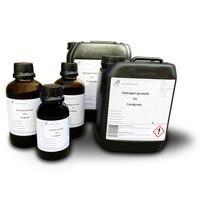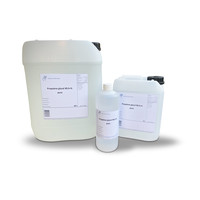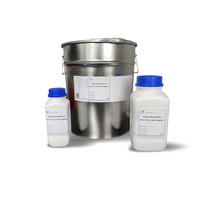You have no items in your shopping cart
Glycerol 99.7% foodgrade
- Buy 2 and save 5%
- Buy 6 and save 10%
Buy glycerol
Glycerol is a very common substance, which we often see on labels of the products that can be bought in most supermarkets. You can easily buy glycerol online via Laboratoriumdiscounter.
What is Glycerol?
Glycerin wird auch als Glycerin bezeichnet. Es ist eine hochviskose Flüssigkeit, was bedeutet, dass es von Natur aus etwas viskos ist. Glycerin ist farblos, schmeckt süß und ist ungiftig, weshalb wir es auch in der Lebensmittelindustrie sehen. Wussten Sie, dass wir auch Glycerin in unserem Körper haben? Der Stoff kommt natürlicherweise im menschlichen Körper vor und dient der Synthese von Fetten und Fettsäuren, bei deren Abbau Glycerin freigesetzt wird.
Glycerol properties
Glycerol or glycerin is characterized by its viscosity, it is colorless and is easily soluble in water. Other features are:
- density: 1.23
- melting point: 18.2 degrees Celsius
- boiling point : 290 degrees Celsius
- flash point : 160 degrees Celsius
- auto-ignition temperature: 370 degrees Celsius
- WCK 1
- CAS number: 56-81-5
- EC number : 200-289-5
You should wear protective clothing when working with glycerol. If a child or pet swallows glycerol, try to vomit and consult a doctor. If it comes into contact with the eyes, rinse them out. It is not harmful or irritating to the skin.
Why buy glycerol?
Glycerol is used in vaccines, but also in personal care products, such as toothpaste, mouthwash, shampoo, hand cream and soap. In food we find it as orange juice, or as a sweetener in sweets and pastries. If glycerin is used in food, this is indicated by E number 422. In addition to these applications, it is also used in industry and in the agricultural world. You can buy glycerol from 1 liter in our webshop for a very friendly price. The more you order of the same product, the more discount you get!
CAS : 56-81-5
Melting point : 20 °C
Boiling point : 290 °C
Molar mass: 92.09 g/mol
Synonym : Glycerin
Who can buy glycerol?
Glycerol can be purchased by both business and private consumers at Laboratoriumdiscounter.nl. We are one of the few webshops where private consumers can also easily order. In addition to glycerol, you can also order DMSO, isopropyl alcohol, dichloromethane, ethanol and borax easily and quickly online from us. Also view our full range of private label chemicals.
Applications of Glycerol:
medical
Glycerol is used in medical preparations to achieve a smoothing or softening effect. For example, it is used in cough syrups and suppositories. When glycerol reacts with concentrated nitric acid and sulfuric acid (nitric acid), nitroglycerin is formed, a substance that is used, among other things, for the symptomatic treatment of heart cramps (angina pectoris). It is also used as an additive in vaccines.
Personal care
Glycerol is used as a moisturizing agent in cosmetics, for example toothpaste, mouthwash, shampoo, hand cream and soap. Borax glycerin is used for inflammation in the mouth (touch).
Power supply
Glycerol is used in food as a solvent or sweetener, for example in sweets, pastries and margarine. It is a permitted substance with E number 422.
Toys
Bubble bladder often contains glycerol to lower the high surface tension of water, so you can blow large bubbles.
Industry
Glycerol finds industrial applications as a plasticizer in plastics and as an antifreeze. A chemical reaction with a mixture of concentrated nitric acid and sulfuric acid produces nitroglycerin, the basis of dynamite. It is also used as a base for polyols, which in turn are a component of polyurethane.
Due to the growth of biodiesel production, glycerol production has also increased and new applications of glycerol have been sought. For example, it can be used for the production of epichlorohydrin. Through bacterial fermentation, glycerol can be converted into hydrogen, ethanol, succinic acid, 1,3-propanediol and other substances. The possibility of using glycerol in antifreeze is also being investigated.
Glycerol is used to fill the measuring part of pressure gauges, making them less sensitive to vibrations.
Fermentation
Wet biomass is increasingly fermented in fermentation installations. In co-fermentation, a wet biomass (usually manure) is added to another biomass (such as an agricultural product, a by-product from the food industry or glycerol). There is a so-called green list of substances that are allowed in fermentation plants. Biogas is formed through fermentation. What remains is the digestate (the wet end product), which can be used as fertilizer.
$$$$$
%%%%%
| MSDS Glycerol (NL) |
| MSDS Glycerol (DE) |
| MSDS Glycerol (EN) |
| MSDS Glycérol (FR) |
| MSDS Glicerol (ES) |

